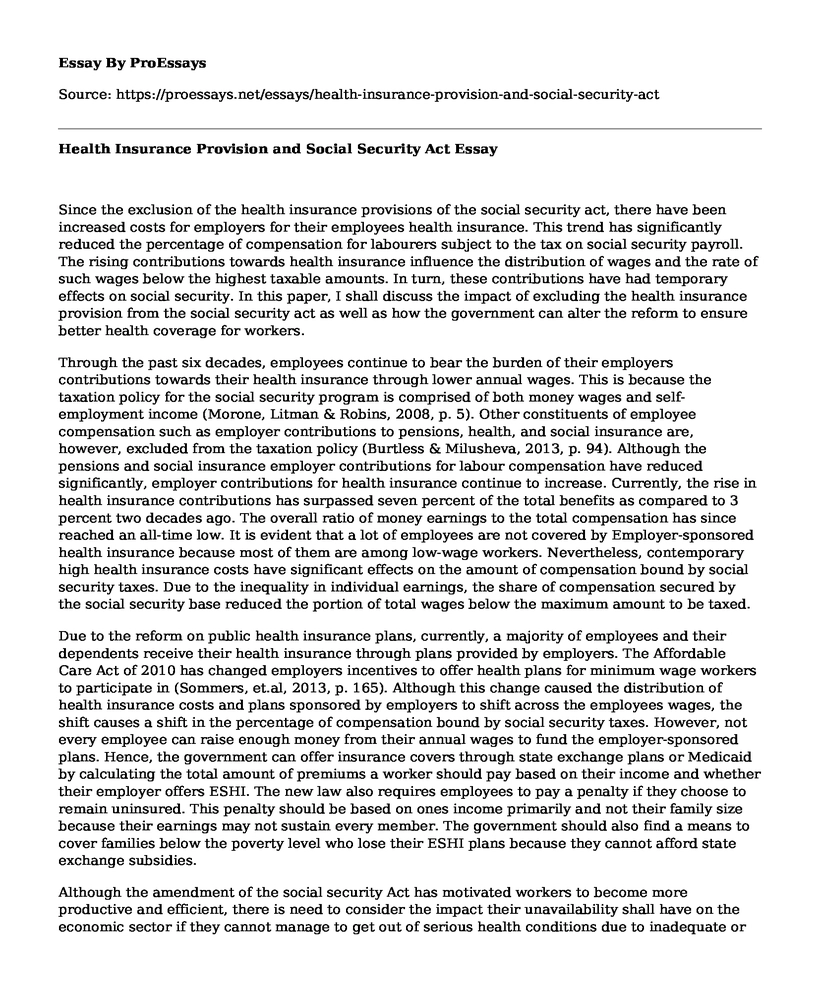Since the exclusion of the health insurance provisions of the social security act, there have been increased costs for employers for their employees health insurance. This trend has significantly reduced the percentage of compensation for labourers subject to the tax on social security payroll. The rising contributions towards health insurance influence the distribution of wages and the rate of such wages below the highest taxable amounts. In turn, these contributions have had temporary effects on social security. In this paper, I shall discuss the impact of excluding the health insurance provision from the social security act as well as how the government can alter the reform to ensure better health coverage for workers.
Through the past six decades, employees continue to bear the burden of their employers contributions towards their health insurance through lower annual wages. This is because the taxation policy for the social security program is comprised of both money wages and self-employment income (Morone, Litman & Robins, 2008, p. 5). Other constituents of employee compensation such as employer contributions to pensions, health, and social insurance are, however, excluded from the taxation policy (Burtless & Milusheva, 2013, p. 94). Although the pensions and social insurance employer contributions for labour compensation have reduced significantly, employer contributions for health insurance continue to increase. Currently, the rise in health insurance contributions has surpassed seven percent of the total benefits as compared to 3 percent two decades ago. The overall ratio of money earnings to the total compensation has since reached an all-time low. It is evident that a lot of employees are not covered by Employer-sponsored health insurance because most of them are among low-wage workers. Nevertheless, contemporary high health insurance costs have significant effects on the amount of compensation bound by social security taxes. Due to the inequality in individual earnings, the share of compensation secured by the social security base reduced the portion of total wages below the maximum amount to be taxed.
Due to the reform on public health insurance plans, currently, a majority of employees and their dependents receive their health insurance through plans provided by employers. The Affordable Care Act of 2010 has changed employers incentives to offer health plans for minimum wage workers to participate in (Sommers, et.al, 2013, p. 165). Although this change caused the distribution of health insurance costs and plans sponsored by employers to shift across the employees wages, the shift causes a shift in the percentage of compensation bound by social security taxes. However, not every employee can raise enough money from their annual wages to fund the employer-sponsored plans. Hence, the government can offer insurance covers through state exchange plans or Medicaid by calculating the total amount of premiums a worker should pay based on their income and whether their employer offers ESHI. The new law also requires employees to pay a penalty if they choose to remain uninsured. This penalty should be based on ones income primarily and not their family size because their earnings may not sustain every member. The government should also find a means to cover families below the poverty level who lose their ESHI plans because they cannot afford state exchange subsidies.
Although the amendment of the social security Act has motivated workers to become more productive and efficient, there is need to consider the impact their unavailability shall have on the economic sector if they cannot manage to get out of serious health conditions due to inadequate or lack of insurance coverage.
References
Burtless, G., & Milusheva, S. (2013). Effects of Employer-Sponsored Health Insurance Costs on Social Security Taxable Wages. Social Security Bulletin, 73(1), 83-108.
Morone, J. A., Litman, T. J., & Robins, L. S. (2008). Health politics and policy. Albany: Delmar Publishers.
Sommers, B. D., Buchmueller, T., Decker, S. L., Carey, C., & Kronick, R. (2013). The Affordable Care Act has led to significant gains in health insurance and access to care for young adults. Health affairs, 32(1), 165-174.
Cite this page
Health Insurance Provision and Social Security Act. (2021, Mar 19). Retrieved from https://proessays.net/essays/health-insurance-provision-and-social-security-act
If you are the original author of this essay and no longer wish to have it published on the ProEssays website, please click below to request its removal:
- To Eat Meat or Not Essay Example
- Adherence in Diabetes Patients Assignments Paper Example
- Essay Sample on Impact of Cannabis on PTSD Recovery
- Tectonic Hazards: Natural Phenomena, Risks and Challenges - Essay Sample
- Essay on the Red Cross: 97 Million Volunteers United for Humanitarianism
- Essay Sample on COVID-19 Film: LSHTM Experts Answer Questions on How to Tackle the Virus
- Essay Example on Modern Birth Control: Hormonal Contraception and its Benefits







